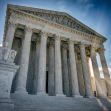The Texas State Board of Education voted on Friday to approve Bible-infused lesson plans for elementary schools. This move has sparked heated debate over the role of religion in public education. The optional curriculum, designed for kindergarten through fifth grade, could be implemented as early as the next school year, with additional funding incentives for schools that adopt it.
Republican Gov. Greg Abbott and other supporters argue that the Bible plays a significant role in American history and literature, making its inclusion a valuable educational tool. However, critics, including educators and parents, warn that the curriculum risks alienating non-Christian students and potentially violating the constitutional separation of church and state.
The new lessons, created by the Texas Education Agency following a 2023 law passed by the GOP-controlled legislature, emphasize Christianity more heavily than other religions in reading and language arts modules. Proponents claim this will enhance students’ cultural and historical understanding, citing examples such as Biblical references in literature and common idioms.
“This curriculum will enrich students’ learning by helping them understand the Biblical roots of many modern expressions and ideas,” said Mary Castle, director of government relations for Texas Values, a conservative advocacy group.
Opponents argue that the curriculum blurs the line between education and religious indoctrination, raising serious First Amendment concerns. Amanda Tyler, executive director of the Baptist Joint Committee for Religious Liberty, criticized the curriculum as inappropriate for young children, saying it presents religious stories in a way that may confuse faith-based beliefs with factual education.
The curriculum’s constitutionality is likely to be challenged, particularly given similar efforts in other states. Louisiana’s recent attempt to mandate the display of the Ten Commandments in classrooms was blocked by a federal judge, and a similar Bible-related initiative in Oklahoma is facing legal challenges.
The introduction of Bible-infused lesson plans in Texas public schools raises significant First Amendment concerns, particularly related to the Establishment Clause, which prohibits the government from endorsing or promoting a specific religion. Critics argue that the curriculum’s emphasis on Christian teachings risks violating the constitutional principle of separation of church and state.
The Establishment Clause of the First Amendment prevents government entities, including public schools, from favoring one religion over others or promoting religion in general. Public schools, as government institutions, are required to remain neutral in matters of religion to ensure that students of all faiths—or no faith—feel equally included.
The U.S. Supreme Court has historically interpreted the Establishment Clause to limit religious activities in public schools. In Engel v. Vitale (1962), the Court ruled that school-sponsored prayer violated the Constitution, even if participation was voluntary.
Similarly, in Abington School District v. Schempp (1963), the Court held that Bible readings in public schools were unconstitutional because they amounted to religious endorsement.
These precedents suggest that Texas’ curriculum could be subject to legal challenges, particularly if the instruction is seen as advancing Christianity over other religions.
By focusing heavily on Christian teachings, the curriculum risks alienating students from diverse religious backgrounds, including Jewish, Muslim, Hindu, Buddhist, and atheist students. Critics argue that this could create an exclusionary environment, potentially infringing on the Free Exercise Clause of the First Amendment, which protects individuals' rights to practice their own religion—or abstain from religious practice—without government interference.
While supporters of the curriculum argue that the Bible’s influence on history and culture makes it a valuable teaching tool, courts have drawn a clear distinction between teaching about religion in a secular, educational context and promoting religious beliefs. For example, public schools are allowed to teach about the Bible’s historical or literary significance, but such instruction must be presented objectively and without favoring religious perspectives.
The implementation of this curriculum is likely to face lawsuits from parents, advocacy groups, or civil liberties organizations. Courts may need to evaluate whether the curriculum crosses the line from neutral education into unconstitutional religious promotion.
Legal experts say that the curriculum’s structure and content, as well as how it is presented in classrooms, will be critical in determining whether it survives judicial scrutiny. If found to violate the Establishment Clause, the lesson plans could be struck down as unconstitutional.
The 15-member Texas board, composed of 11 Republicans and four Democrats, narrowly approved the curriculum in an 8-7 preliminary vote earlier this week. One Republican member was appointed by Abbott shortly before the vote to fill a vacant seat temporarily, further underscoring the political stakes.
Gov. Abbott has expressed strong support for the new lesson plans, emphasizing their alignment with Texas values.
Texas joins other Republican-led states in efforts to bring religion into public classrooms. In Oklahoma, state officials are pursuing a $3 million plan to provide Bibles to public schools, while Louisiana lawmakers sought to embed the Ten Commandments in classrooms.






